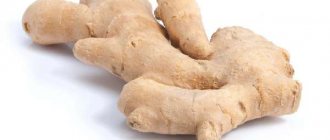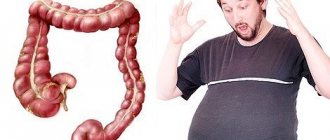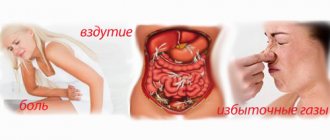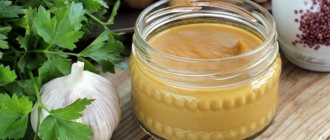Main reasons
There are two main causes of pathology:
- Insufficient contractile function of the stomach. Difficulties arise with the formation of a food bolus and the timely movement of food into the intestines. In this case, the process of decay begins. Similar problems also arise with weak peristalsis.
- Insufficient amount of food enzymes. This occurs as a result of congenital abnormalities and dysbiosis. Most often, the onset of symptoms is triggered by overeating.
Why is burping accompanied by diarrhea?
Proteins contained in stuck food in the intestinal cavity not only begin to rot and give off the smell of rotten eggs, but also release toxic substances that cause flatulence, diarrhea and abdominal pain.
If alternative symptoms are added to the symptoms in the form of fever and vomiting, then there is a high probability of intoxication of the digestive organs by pathogenic microorganisms. Toxins secreted by helminths and food decay processes create favorable conditions for the development of pathologies in the gastrointestinal tract.
Possible diseases
Often belching or diarrhea is a symptom of a serious illness:
- Gastritis. The development of the disease is caused by improper nutrition and damage to the body by the bacterium Helicobacter pylori.
- Pancreatitis. With this pathology, digestive enzymes are released and fermentation in the stomach is noted.
- Dysbacteriosis. Instead of beneficial bacteria, pathogenic microorganisms develop on the mucous membranes of the gastrointestinal tract. Such changes are also observed with the development of gastric candidiasis.
- Dyskinesia of the gallbladder. The process of bile flow is disrupted, and without it, protein digestion cannot be properly carried out.
- Reflux of gastric juice into the esophagus. Pathology belongs to the group of reflex ones.
- Intestinal obstruction. It is observed due to strangulation of the hernia, the formation of adhesions.
- Inflammatory processes.
- Crohn's disease.
Determining the cause, taking into account the characteristics of symptoms
To determine the exact cause of such problems, you need to take into account all the features of the symptoms. Of particular importance is the smell of belching, the frequency of diarrhea, and the presence of other clinical manifestations.
Belching rotten eggs, hydrogen sulfide
Belching hydrogen sulfide, which smells like a rotten egg, accompanied by diarrhea, signals the development of gastrointestinal pathologies.
Initially, symptoms arise from eating fatty, salty, spicy foods . In the future, rotten belching and diarrhea are complemented by other symptoms.
Among the main reasons are the following:
- helminthic intestinal infestation;
- violation of the outflow of bile;
- hypoacid gastritis;
- dysbacteriosis;
- fermentation;
- violation of peristalsis.
Also among the factors that provoke such symptoms are poisoning with low-quality, expired products, and disruption of the intestinal microflora due to taking medications.
With a sour smell
Acid aerophagia and loose stools are observed when the intestinal microflora is disturbed.
The following factors can cause such changes:
- taking antibiotics and certain groups of other drugs;
- unfavorable environmental conditions;
- exposure to stress.
Active colonization of the mucous membranes by pathogenic microorganisms begins.
In addition to aerophagia and diarrhea, the following symptoms occur:
- flatulence;
- heaviness in the stomach;
- the process of digesting food is disrupted;
- urinary tract infection.
Pain in the abdomen
Watery diarrhea, constant belching, and abdominal pain indicate problems in the digestive system. They are caused by poor nutrition.
An adult often has a seething stomach, gas accumulates, and discomfort appears with frequent consumption of fast food, snacking on the go, and the habit of overeating before bed.
Also, similar changes are observed in the following pathologies:
- chronic gastroduodenitis;
- gastric candidiasis;
- pancreatitis;
- ulcer.
Belching air
If such problems occur only occasionally, there is no cause for concern. Belching of air and diarrhea are observed due to overeating . It is enough to correctly formulate a diet to eliminate unpleasant symptoms.
The mechanism for the occurrence of odorless aerophagia is explained by the fact that the food fermentation reservoir is densely filled, preventing the entrance sphincter from closing, and gases are pushed out.
Liquid stool appears due to accelerated peristalsis.
Symptoms appear after eating
The main reason for the appearance of such changes after eating is overeating. The following factors provoke the development of the problem:
- food is not chewed properly;
- food is absorbed very quickly;
- eating on the go;
- talking while eating;
- too cold or hot food.
When to see a doctor
Regular manifestation of symptoms and deterioration of the condition indicate a serious illness. If the belching has a rotten smell, and the diarrhea is sour, the person is constantly tormented by discomfort, it is recommended to undergo a medical examination.
The first doctor you should contact is a gastroenterologist. The diagnosis is made based on examination and a number of studies:
- detailed and general blood test;
- irrigoscopy;
- gastroscopy;
- Ultrasound of the abdominal organs;
- laboratory tests of stool.
Indications for immediate hospitalization are: increased body temperature, persistent nausea, bloody streaks in the stool.
Treatment is aimed at eliminating the cause of the disease, replenishing salts and fluids lost with diarrhea. Sorbents are prescribed to remove infection and harmful bacteria. The patient is prescribed plenty of fluids, bed rest, and gastrointestinal lavage.
For diseases of the digestive tract, the patient is prescribed medications to normalize the processes of digestion and elimination of food.
You cannot self-medicate. This threatens the development of complications and deterioration of the condition. Regardless of the cause of belching, diarrhea and other symptoms, a diet is prescribed.
Diagnostic methods
For correct diagnosis, the following activities are carried out:
- biochemical and general blood test;
- Ultrasound examination of the peritoneal cavity:
- stool test to detect occult blood;
- manometry (the method allows you to evaluate peristalsis);
- coprogram;
- colonoscopy;
- determination of the acidity level of gastric juice;
- X-ray of the stomach;
- fibrogastroscopy.
Treatment tactics
Therapy is carried out comprehensively. After making a diagnosis, you need not only to choose the right drug.
It is important to follow a diet . Folk remedies are also used.
Medications
Treatment is selected taking into account the cause that led to such changes. In case of poisoning, first of all, wash the stomach.
Prescribe sorbents (Sorbex, activated carbon, Smecta). With their help, it is possible to neutralize the effect of harmful substances and remove them from the body.
If the problem arose as a result of overeating, enzyme medications are used - Mezim, Enzistal, Festal.
With their help, peristalsis improves and digestive processes are accelerated.
For gastritis, in order to relieve an acute condition, Phosphalugel and Almagel are prescribed. Colibacterin and Linex are also used to prevent dysbacteriosis.
The disorder often occurs with liver pathologies. Drugs are prescribed that restore the functions of the organ and eliminate unpleasant symptoms.
The following remedies are prescribed:
- Allohol;
- Holenzyme;
- Holosas.
In order to maintain water balance, taking Regidron solution is indicated. You need to drink enough liquid.
Folk remedies
Traditional medicine can eliminate unpleasant symptoms. The most effective among them are:
- Thyme. 5 tsp crushed raw materials are poured with a glass of boiling water. The liquid is infused for 40 minutes, filtered. Drink the infusion four times a day, 50 ml at a time.
- Cilantro. 1 tbsp. seeds, pour a glass of boiling water and leave for about half an hour. Take the remedy in the same way as thyme infusion.
- Oak bark. To prepare the infusion, 1 tsp. crushed raw materials are diluted in two glasses of boiled, cooled water. The mixture is infused for 6 hours. Drink the medicine four times a day before meals, 100 ml.
- Clove oil. 5 drops of raw material are applied to refined sugar, chewed, and swallowed.
Nutrition correction
The main condition for effective treatment is diet.
It is necessary to avoid the following products during this period:
- cabbage;
- onion;
- tomatoes;
- nuts;
- fatty dairy products;
- plums;
- lemon;
- cherry;
- legumes;
- canned food;
- fatty meats;
- liver;
- eggs;
- red fish.
After each bowel movement, a person should drink a glass of water. Also, liquid should be systematically supplied to the body throughout the day. This will prevent dehydration.
The menu should include the following products:
- rice, buckwheat porridge;
- soups;
- low-fat dairy products;
- vegetables (baked only).
Alcohol and energy drinks should be completely avoided during treatment.
To replenish lost fluid you should drink:
- grape juice;
- still mineral water;
- sea buckthorn infusion;
- rosehip based tea.
If the symptoms manifest themselves clearly, you should completely stop eating for a day.
Preventive actions
It is not difficult to avoid indigestion, diarrhea, and belching; you just need to follow simple recommendations:
- for any disturbances in the gastrointestinal tract, seek help from a doctor;
- avoid overeating;
- stop consuming high-calorie foods and drinks that promote the formation of gases (kvass, carbonated water, beer, sparkling wine);
- get rid of the habit of talking while eating;
- chew food thoroughly;
- include only high-quality and fresh foods in the diet;
- wash fruits and vegetables thoroughly;
- eat 4-5 times a day, but in small portions;
- eat soups every day;
- give preference to steamed dishes;
- give up fast food and snacks on the go;
- get up from the table when there is still a slight feeling of hunger;
- get rid of bad habits.
Diet
To stabilize the passage of hard feces, take dairy-free porridges, stewed vegetable dishes, and pureed soups several times a day. It is not recommended to eat fatty meat, fish, cottage cheese, or drink milk. It is important to exclude from the diet any foods that irritate the mucous membrane of the digestive tract and increase gas formation.
Proper drinking will allow you to quickly get on the path to recovery. It is important to drink wild berry jelly in small portions several times a day. It has enveloping properties and improves well-being. Blueberry compote and rice water are good for digestive disorders.
Source










